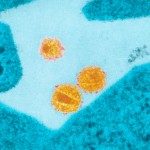Link to Pubmed [PMID] – 21865089
Clin. Immunol. 2011 Oct;141(1):15-30
A small minority of HIV-infected individuals, known as HIV controllers, is able to exert long-term control over HIV replication in the absence of treatment. Increasing evidence suggests that the adaptive immune system plays a critical role in this control but also that a combination of several host and/or viral factors, rather than a single cause, leads to this rare phenotype. Here, we review recent advances in the study of these remarkable individuals. We summarize the epidemiology and clinical characteristics of HIV controllers, and subsequently describe contributing roles of host genetic factors, innate and adaptive immune responses, and viral factors to this phenotype. We emphasize distinctive characteristics of HIV-specific CD4 T cell responses and of CD4 T cell subpopulations that are frequently found in HIV controllers. We discuss major controversies in the field and the relevance of the study of HIV controllers for the development of novel therapeutic strategies and vaccines.

